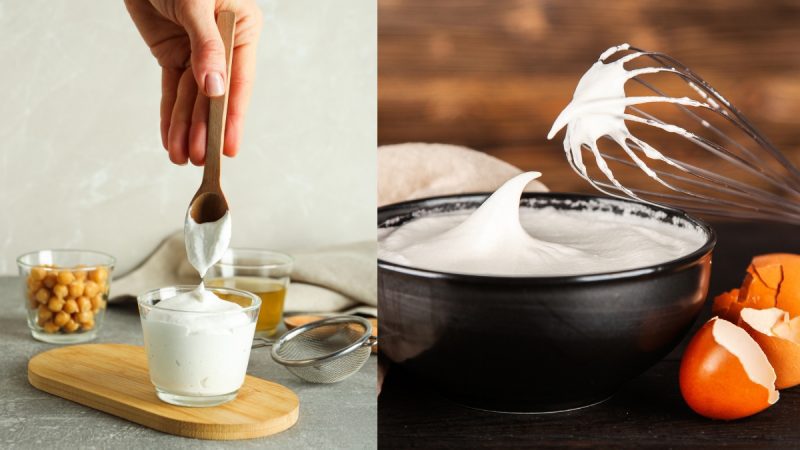In the culinary world, creativity often thrives on the art of substitution. Whether it’s due to dietary restrictions, ingredient availability, or simply a desire for experimentation, the quest for alternative ingredients has sparked a fascinating journey of culinary discovery. From swapping oils for butter to transforming humble oats into breadcrumbs, the realm of food substitutes offers many possibilities limited only by imagination. These ingenious substitutions not only cater to specific dietary needs but also introduce new flavours, textures, and dimensions to traditional recipes. Explore these amazing food substitutes, how they work, and the intriguing culinary experiences they offer.
Food Substitutes That Work Wonders
1. Rolled Oats For Breadcrumbs
Rolled oats are a nutritious and versatile substitute for breadcrumbs in various recipes, including cutlets and burgers. When ground or pulsed in a food processor, rolled oats create a coarse texture similar to breadcrumbs, helping bind ingredients together and absorb excess moisture. Additionally, rolled oats add fibre and nutrients to dishes, making them a healthier alternative to traditional breadcrumbs.
2. Honey For Sugar
Honey is a natural sweetener with a distinct flavour profile that adds depth to recipes. When substituting honey for sugar, it’s essential to consider its higher moisture content and sweetness level. Generally, you can replace sugar with honey using a 1:1 ratio but reduce the amount of liquid in the recipe slightly to compensate for the added moisture. Additionally, honey provides trace amounts of vitamins and minerals, offering potential health benefits compared to refined sugar.
3. Oils For Butter
Substituting oils for butter is a popular choice, especially in vegan or lactose-intolerant diets. Oils like coconut, olive, or even vegetable oil can be used as a 1:1 replacement for butter in many recipes. While butter lends richness and flavour due to its milk solids, oils contribute moisture and help create a tender texture in baked goods. Additionally, oils contain healthy fats, making them a suitable alternative for those seeking to reduce their saturated fat intake.
4. Gluten-Free Flour For Regular Flour
For individuals with gluten intolerance or celiac disease, gluten-free flour blends provide a suitable alternative to wheat flour. These blends typically contain a combination of flours like rice, tapioca, and potato starch to mimic the texture and structure of traditional flour. While gluten-free flours can produce similar results in baking, they may require additional binders or leavening agents to achieve the desired consistency.
5. Rice Flour For Cornflour
Rice flour, made from finely ground rice grains, is a versatile alternative to corn flour in cooking and baking. Like cornflour, rice flour acts as a thickening agent in sauces, soups, and gravies, providing a smooth texture. However, rice flour may have a slightly different texture and flavour profile compared to cornflour, so adjustments may be needed based on personal preference and recipe requirements.
6. Aquafaba Or Flaxseed For Eggs
The liquid from canned chickpeas, aquafaba, and flaxseed meal are both excellent egg substitutes in baking. Aquafaba mimics the binding properties of eggs due to its protein content, while flaxseed meal, when mixed with water, forms a gel-like consistency similar to beaten eggs. These substitutes work well in recipes like muffins, pancakes, and cookies.
7. Dark Alcohol For Vanilla
Dark alcohols such as rum or bourbon can be used as substitutes for vanilla extract in recipes, especially in baked goods like cakes, cookies, and puddings. While vanilla extract adds a sweet, floral aroma, dark alcohols impart rich, caramelised notes that enhance the flavour profile of desserts. When using alcohol as a substitute, it’s essential to consider its potency and adjust the amount accordingly to avoid overpowering the other flavours in the recipe.
Also Read: Love The Smell Of Freshly Brewed Coffee? Head Over To 8 Quaint Coffee Shops In Gangtok, Sikkim
8. Toasted Breadcrumbs For Parmesan
Toasted breadcrumbs can be a flavourful substitute for grated Parmesan cheese, particularly as a topping for pasta dishes, salads, or casseroles. When toasted, breadcrumbs develop a nutty flavour and crispy texture that add depth and contrast to savoury dishes. While they may not provide the same umami-rich flavour as Parmesan, toasted breadcrumbs are called ‘poor man’s parmesan’ in Italy for a reason.
9. Lemon + Dairy For Buttermilk
Buttermilk lends a tangy flavour and tender texture to baked goods. However, when you’re short on it, a quick substitute can be made by adding lemon juice or vinegar to dairy milk. This combination mimics the acidity of buttermilk and helps activate baking soda for leavening. The result is baked goods with a similar crumb and moisture level as those made with traditional buttermilk.
10. Yoghurt + Baking Soda For Baking Powder
A mixture of yoghurt and baking soda can effectively replace baking powder in recipes that require leavening agents. Baking powder is a combination of an acid and a base, which react together to produce carbon dioxide bubbles, causing baked goods to rise. Similarly, the acidity of yoghurt activates the baking soda, resulting in a similar leavening effect. This substitution is particularly useful when baking powder is unavailable or if you prefer a homemade alternative with fewer additives.
With these food substitutes, transform ordinary recipes into extraordinary culinary masterpieces!
Cover Image Courtesy: Canva
For more such snackable content, interesting discoveries and the latest updates on food, travel and experiences in your city, download the Curly Tales App. Download HERE.

